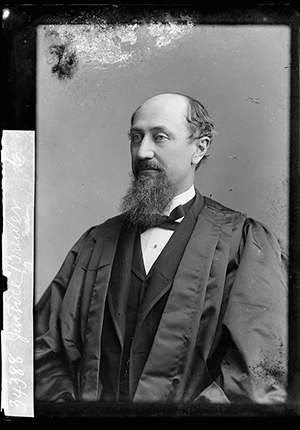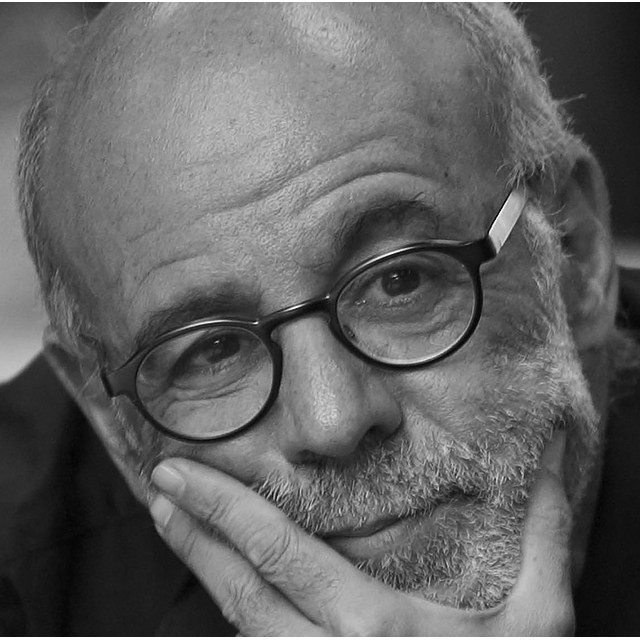Historic Document
The Nation’s Safeguard (1893)
David J. Brewer | 1893

Library of Congress, Prints and Photographs Division, C. M.Bell Studio Collection
Summary
An intellectual leader of the Fuller Court (1888-1910), Justice David J. Brewer was a firm believer that free market capitalism, including the inequalities that he believed it naturally generated as it rewarded effort and initiative, and produced wealth, was the foundation of the U.S.’s unprecedented rise to prosperity. Brewer held that the Constitution, with its provisions for limited government and individual rights, provided a foundation for that underlying economic order. Brewer was convinced that a rising sympathy for mass democratic majoritarianism, and demagogy, at odds with the rights of individuals and minorities (such as those who had been economically successful) was now posing a genuine threat to the nation’s sustaining constitutional order. That order, he explained, which had been promulgated in calmer, more rational times in a written constitution by "We the People," acting in our sovereign capacity, by the lights of a long tradition of Anglo-Saxon liberty. Brewer argued that it was the high duty of the nation’s independent judiciary sworn to uphold the rule of law to stand up as resolute guardians of the Constitution and enforce it in the teeth of this seething mass democratic uprising that posed dangerous threats to the country’s prosperity, freedom, and its future.
Selected by

William E. Forbath
Lloyd M. Bentsen Chair in Law, and Associate Dean for Research, The University of Texas at Austin School of Law

Ken I. Kersch
Professor of Political Science, at Boston College
Document Excerpt
[Written constitutions] exist, not simply to prescribe modes of action, but because of the restraints and prohibitions they contain. Popular government may imply, generally speaking, that the present will of the majority should be carried into effect; but this is true in no absolute or arbitrary sense, and the limitations and checks which are found in all written constitutions are placed there to secure the rights of the minority. Constitutions are generally, and ought always to be, formed in times free from excitement. They represent the deliberate judgment of the people as to the provisions and restraints which, firmly and fully enforced, will secure to each citizen the greatest liberty and utmost protection. They are rules prescribed by Philip sober to control Philip drunk. When difficulties arise, when the measures and laws framed by a majority are challenged as a violation of these rules and a trespass upon the rights of the minority, common justice demands that the tribunal to determine the question shall be as little under the influence of either as possible….
It may be said that this is practically substituting government by the judges for government by the people, and thus turning back the currents of history. The world has seen government by chiefs, by kings and emperors, by priests and by nobles. All have failed, and now government by the people is on trial. Shall we abandon that and try government by judges? But this involves a total misunderstanding of the relations of judges to government. There is nothing in this power of the judiciary detracting in the least from the idea of government of and by the people. The courts hold neither purse nor sword…. They make no laws, they establish no policy…. They do not govern. Their functions in relation to the State are limited to seeing that popular action does not trespass upon right and justice as it exists in written constitutions and natural law….
Who does not see the wide unrest that fills the land; who does not feel that vast social changes are impending, and realize that those changes must be guided in justice to safety and peace or they will culminate in revolution? Who does not perceive that the mere fact of numbers is beginning to assert itself. Who does not hear the old demagogic cry, “Vox poluli vox Dei” (paraphrased to-day, “the majority is always right”), constantly invoked to justify disregard of those guarantees which have hitherto been deemed sufficient to give protection to private property?
…. In such a time as this the inquiry may well be, what factor in our national life speaks most emphatically for stability and justice…. I am firmly persuaded that the salvation of the nation … rests upon the independence and vigor of the judiciary….
The black flag of anarchism, flaunting destruction to property, and therefore relapse of society to barbarism; the red flag of socialism, inviting a redistribution of property which, in order to secure the vaunted equality … suggests that the State take all property and direct all the life and work of individuals as if they were little children, may seem to fill the air with their flutter. But as against these schemes … the eager and earnest protest and cry of the Anglo-Saxon is for individual freedom and absolute protection of all his rights of person and property…. That personal independence which is the lofty characteristic of our race will assert itself…. And to help and strengthen that good time [when “no honest possessor of property shall live in fear of the slightest trespass upon his possessions”] we shall yet see in every State an independent judiciary … and above them that court, created by the fathers, supreme in fact as in name, holding all … unswervingly true to the mandates of justice….




